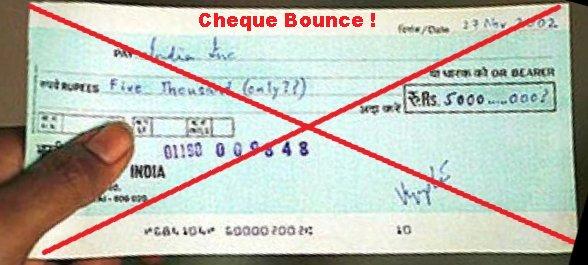The finance ministry has proposed to decriminalise a host of minor offences, including those relating to cheque bounce and repayment of loans, in as many as 19 legislations to help businesses tide over the crisis caused by the coronavirus outbreak.

The 19 legislations include Negotiable Instruments Act (cheque bounce), SARFAESI Act (repayment of bank loans), LIC Act, PFRDA Act, RBI Act, NHB Act, Banking Regulation Act and Chit Funds Act.
"Actions taken for decriminalisation of minor offences are expected to go a long way in improving ease of doing business and helping unclog the court system and prisons," the finance ministry said while inviting comments from stakeholders by June 23 on the 19 legislations.
"It would also be a significant step in the Government of India's objective of achieving 'Sabka Saath, Sabka Vikas and Sabka Vishwas'," it noted.
Based on the feedback, the department of financial services will take a call as to whether a particular section should remain a criminal offence or if it should be suitably modified to decriminalise to improve ease of doing business.
The other legislations listed in the document for consultation for suitable amendments to decriminalise minor offences are Insurance Act, Payment and Settlements Systems Act, NABARD Act, State Financial Corporations Act, Credit Information Companies (Regulation) Act, and Factoring Regulation Act.
The Actuaries Act, the General Insurance Business (Nationalisation) Act, the Banning of Unregulated Deposit Schemes Act, the DICGC Act and the Prize Chits and Money Circulation Schemes (Banning) Act are also among the legislations.
Last month, Finance Minister Nirmala Sitharaman, while announcing the fifth and final tranche of the Rs 20.97-lakh crore stimulus package for the economy hit by the coronavirus pandemic, had said that violations involving minor technical and procedural defaults would be decriminalised as effort to further ease of doing business in the country.
Taking a cue from the decriminalisation of minor offences under Companies Act, the department of financial services came out with a list of minor offences under various legislation and said decriminalisation of minor offences is one of the thrust areas of the government.
With regard to Section 138 of the Negotiable Instruments Act, 1881 relating to cheque bounce due to insufficient amount in the account, a person is deemed to have committed an offence and shall, without prejudice to any other provision of this Act, be punished with imprisonment for a term which may be extended to two years, or with fine which may extend to twice the amount of the cheque, or with both, it said.
For example, Section 40 of LIC Act, 1956 makes an act of a person who wilfully withholds or fails to deliver to LIC as required by section 13, any property or any books, documents or other papers which may be in his possession or unlawfully retains possession of any property of an insurer, punishable with imprisonment which may extend to one year, or with a fine of Rs 1,000 or both.
Similarly, it has proposed to decriminalise sections 36 AD (2) and 46 of the Banking Regulation Act, 1949 and sections 58B (1), 58B (4A), section 58B (5) and section 58B (5A) of the RBI Act, 1934.
In order to develop a consensus, the department of financial services, which administers the Acts, has invited comments from state governments, UT administrations, civil society, academicians, public and private sector organisations and members of the public, it added.
Commenting on the finance ministry's proposal, Pratibha Jain, founding partner, Nishith Desai Associates, said it would provide relief to foreign investors for whom criminal liability for economic offences is a big concern.
Jain further said that "lack of clarity on the jurisdiction of SFIO, ED and CBI often results in multiple regulators and proceedings for the same offence, causing significant issue for defendants."
Moreover, she added, "Unlike some of the developed jurisdictions, Indian regulators especially SFIO and ED do not have processes to allow monetary penalties in lieu of imprisonment, especially for offences that are technical in nature."










